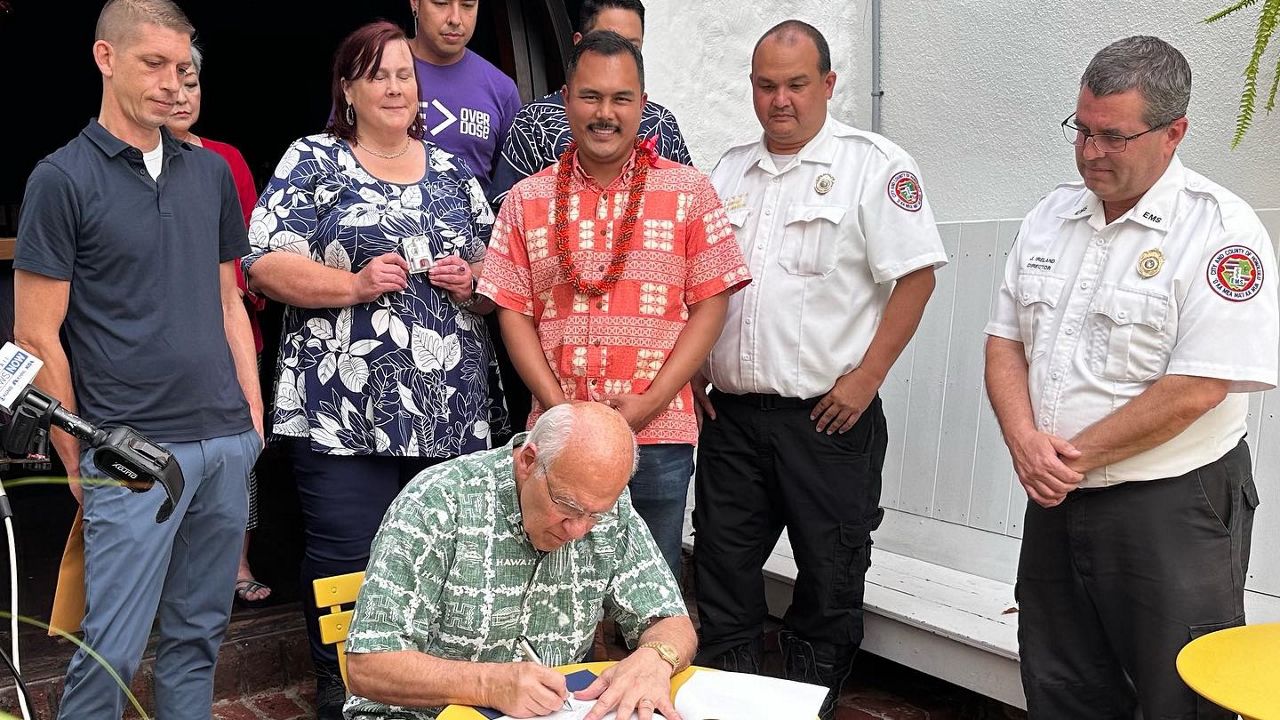HONOLULU — In an effort to combat a threat he deems “absolutely lethal,” Honolulu Mayor Rick Blangiardi signed into law on Tuesday Bill 28, which requires bars, nightclubs and other “high-risk” venues to keep doses of the opioid-reversal drug naloxone on site.
“The very fact that we had to introduce this bill and our battle against the dangers of fentanyl is really unprecedented,” Blangiardi said at a bill-signing ceremony on Tuesday. “Fentanyl represents a threat to people’s lives unlike anything we’ve ever seen before and our war against drugs.”
Earlier this year, the Federal Drug Administration approved Narcan spray for over-the-counter sale. Shortly thereafter, Honolulu City Council member Tyler Dos Santos-Tam introduced Bill 28 to help make the drug more readily available in public venues where opioid overdose may be more likely to occur. The council unanimously passed the measure on July 12.
“This is an example of Honolulu being a leader nationwide,” Dos Santos-Tam said. “We’re the first major city in the U.S. to mandate the bars and nightclubs carry naloxone. This is going to save lives.”
Establishments that serve alcohol are considered potentially high risk because both alcohol and opioids are respiratory depressants that, when mixed, can result in impaired motor control, respiratory arrest or fatal overdose. Dos Santos-Tam said the city in conjunction with the Hawaii Health and Harm Reduction Center distributed doses of Narcan to several Chinatown bars earlier this month.
“A few days ago, I ran into one of the bar managers, and they’ve actually had to use one of the doses that we gave out just a week and a half ago because of a suspected overdose that happened at their bar,” he said. “If we hadn’t given this out a week and a half ago, we would be in a whole lot of trouble with the person who had the suspected overdose. This is a real-life example of this bill working, and we hope that we can work with the liquor commission to help roll this out.
The Honolulu Liquor Commission will provide free “starter doses” for all liquor licensees. A portion of the nearly $1.4 million the state will receive in opioid settlement funds will be used for replacement doses.
According to Honolulu Emergency Services director Jim Ireland, fentanyl is a fairly recent but very significant threat to public health on Oahu.
From 2018 to 2020, opioid-overdose deaths in Hawaii increased nearly 500%, to 274 from 59, according to the state Department of Health.
Ireland said fentanyl overdoses have waxed and waned in relation to several high-profile drug busts.
“Unfortunately, in the last two weeks, we are now seeing an uptick in cases where before we were getting might be one case a week, now we’re back up to two or three overdose cases a day,” Ireland said. “And these are happening all over. They’re happening in people’s homes. They’re happening in businesses. They’re happening in legal game rooms. They’re happening in people’s cars.
“And the majority of the people who are being found in an overdose scenario are not knowingly taking fentanyl,” he said. “They think they’re taking methamphetamine; they think they’re taking cocaine. And in fact when we wake them up and we save their life, they’re quite shocked to find out they actually started a line of fentanyl or took a fentanyl pill that was counterfeited to look like an OxyContin.”
Ireland said naloxone is a safe, effective way to keep people who have overdosed alive until paramedics can arrive.
Current efforts to make the drug more broadly available date back to 2016, when then-Gov. David Ige signed Act 68, which provided immunity to health care providers who prescribed, dispensed or administered naloxone and to any person who administered the drug to a person overdosing from an opioid. The law further authorized emergency personnel and first responders to administer the drug and required Medicaid to cover its use.
Since then HHHRC, the state Department of Health and the City and County of Honolulu have distributed more than 50,000 doses and recorded more than 2,000 reports of subsequent lifesaving use, according to HHHRC executive director Heather Lusk.
Many bar and nightclub owners have welcomed the initiative.
“We hope that we never have to use (the doses),” said Ryan Kalei Tsuji, co-owner of the Lei Stand. “This is something of course that’s preventative, but it’s very comforting to know that should we have to deploy this and use this, that it is available and that we can work to keep our patrons safe.”



